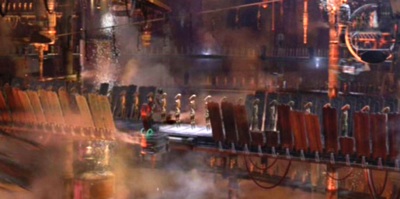Humans Are the Sex Organs of Technology
[Translations: Japanese]
I claim that technology has its own agenda. What is the evidence that technology as a whole, or the technium as I call it, is autonomous? Because without autonomy, one could argue, how can something have its own agenda? I have three parts to my answer.
First, I believe that a system can have an agenda even when it depends upon another system to remain viable. Let’s take the human mind and human culture. Obviously humans are animals, and just another creature of evolution. As a mammal, we must obey the rules of biology. We are part of the trajectory of living tissue: our flesh must breathe, metabolize, mate, excrete, and eventually die. The agenda of our bodies is exactly the agenda of any other animal body.

But we also claim that we are different than animals, and our effect on the earth seems to be proof of this. We build very large structures (cities) unlike any other in scale. The skyscrapers of termites and the reefs of coral are dwarfed by the skyscrapers and concrete reefs of New York, even relative to their size. We have transformed the surface and eliminated other species at a scale way beyond other species. We mess with the climate on a scale few individual species can. And of course we have made many new objects and “organisms” – which no other creature has. It is clear that humans have their own agenda, which the rest of biology does not have.
Yet, human mind and human culture would die if all animal life (including human animals) would die. Human minds are dependent on the system of animal life. So by your logic, human minds could not have their own agenda. But we do. Why? Because the autonomy of human culture operates in a different sphere than animal life, even though it is “dependent” on it. In the same way, the autonomy of the technium operates in a different level than human animal life, even though it is dependent on human life.
Second, technology is still young. The concept of “technology” was not invented until 1829, and most of what we call technology just arrived on earth this century. We consider a two-year old baby to be alive and “autonomous” even though it is dependent on its parents to remain alive. We know that our children will eventually leave us and become autonomous parents of their own, but while they are our children they need us, even though they have their own agendas. Technology is our child. As humans, we are parents to all technologies, nurturing them, hopefully training them to be on their own.

Thirdly, eventually technology will far more autonomous than it is today. Right now not only are we the parents of the technium, we are also the sex organs of technology. From technology’s view, we are the mysterious walking-around glands that reproduce them. They may be able to operate on their own, but they need us to reproduce them. This is already changing. Most computer chips in the world today are designed in part by other computer chips. Most robotic devices are manufactured in part by other robotic devices. As we improve chips and robots, there is no reason to believe that at some point computers will wholly design some other computers, and some robotic systems wholly manufacture other robotic systems. The next step seems inevitable: technology will reproduce itself.
I have to agree that right this minute there is no autonomously reproducing technology, and there is no autonomously sustainable technology. Instead we have an infant technium, that like a baby, has its own demands. Even a small child will quickly train its parents to meet its wants as well as its needs. It uses its weak powers to gain resources (food, attention, permission) in order to grow. If we stand back far enough we can see that technology tends to create an environment that favors the growth of yet more technology. Technology rarely makes it harder to make more technology. The technium is geared to keep expanding the technium. Technology has trained us, its parents and its gonads. Technology makes humans wealthier, with more leisure to consume, which leads to more technology. The more technology we make, the more we need to make to keep it all going. This positive feedback loop is exactly the kind of self-preservation strategy a system with its own agenda would develop.
Technology cannot reproduce itself without our help at the moment, but it is expanding, growing more complex, and smarter. Most importantly, the technium is evolving faster every day. While it depends on us, we are increasingly dependent on it. Like any child, it has its demands. So far, humanity as a whole is in denial that it even has a child.


